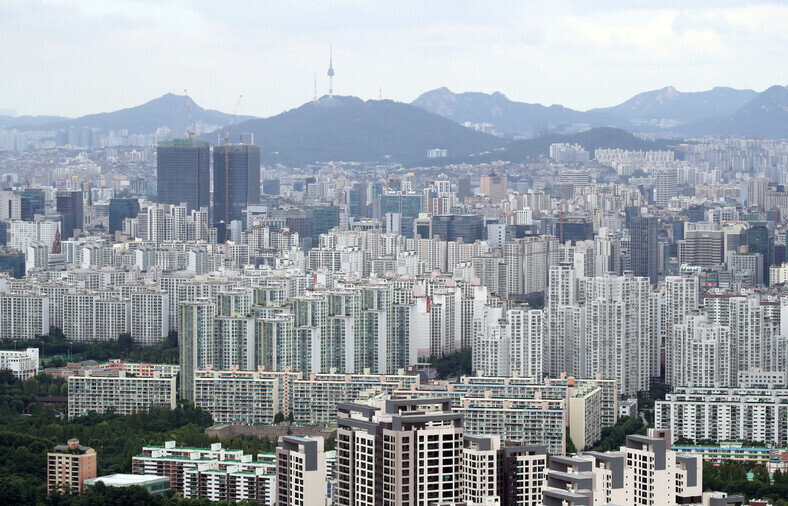hankyoreh
Links to other country sites 다른 나라 사이트 링크
Housing prices in Seoul doubled under Moon administration, civic group says

The price of high-rise apartments in Seoul has doubled during the four years of the Moon administration, according to a new report.
Citizens’ Coalition for Economic Justice (CCEJ) said in a press conference Wednesday that the average market price of 115,000 units at 75 apartment complexes in Seoul has risen 93% during the four years from Moon Jae-in’s inauguration in May 2017 to May 2021, from 20.61 million won (US$18,116) to 39.71 million won (US$34,905) per pyeong, a Korean unit equivalent to around 3.3 square meters.
That amounts to an average price change of US$5,490 to US$10,580 per square meter.
The average price of a 30 pyeong (that is, 99m2) apartment rose by about 570 million won (US$501,128) during that time period, from 620 million won (US$545,086) to 1.19 billion won (US$1,046,213).
The CCEJ based its analysis of market prices on apartment sales data from KB Kookmin Bank, focusing its selection on sample lots and large apartment complexes with around 1,000 units.
However, the Ministry of Land, Infrastructure and Transport (MOLIT) previously said the average price of Seoul apartments had reached 720 million (US$632,968) by the end of 2020, up 17% (around 100 million won) from 620 million won (US$545,055) in May 2017.
“MOLIT is providing distorted statistics without revealing anything about the sample it analyzed or its grounds for selecting that sample,” the CCEJ said, while comparing the data it and KB Kookmin Bank had used to analyze the increase in apartment prices throughout Seoul over the same period of MOLIT’s analysis.
KB Kookmin Bank found that the average sale price of apartments across Seoul had increased by 75% between May 2017 and January 2021, while the CCEJ found an increase of 79%.
“KB Kookmin Bank and our data are similar, but the MOLIT statistics derive from data falsified to be three or four times lower,” the CCEJ contended.
The CCEJ’s analysis shows that while apartment prices were nearly doubling, real income only rose 2.98 million won (US$2,622), from 45.2 million (US$39,765) to 48.18 million (US$42,387) a year.
Presuming that a household were to save every last cent of its disposable income, it would take 25 years to buy a 99m2 apartment in Seoul. That’s 11 years more than 2017 when the same calculation yielded 14 years.
“If the government is still determined to contain soaring housing prices, it needs accurate information about the rise in housing prices. That should start with a thorough overhaul of these distorted real estate statistics. To stabilize housing prices, the government needs to scrap policies that cause housing prices to rise, such as the redevelopment of public property and a third phase of ‘new cities,’ and to instead provide large numbers of long-term public housing units,” the CCEJ said.
By Lee Jae-ho, staff reporter
Please direct comments or questions to [english@hani.co.kr]

Editorial・opinion
![[Guest essay] Maybe Korea’s rapid population decline is an opportunity, not a crisis [Guest essay] Maybe Korea’s rapid population decline is an opportunity, not a crisis](https://flexible.img.hani.co.kr/flexible/normal/500/300/imgdb/original/2024/0430/9417144634983596.jpg) [Guest essay] Maybe Korea’s rapid population decline is an opportunity, not a crisis
[Guest essay] Maybe Korea’s rapid population decline is an opportunity, not a crisis![[Column] Can Yoon steer diplomacy with Russia, China back on track? [Column] Can Yoon steer diplomacy with Russia, China back on track?](https://flexible.img.hani.co.kr/flexible/normal/500/300/imgdb/original/2024/0430/1617144616798244.jpg) [Column] Can Yoon steer diplomacy with Russia, China back on track?
[Column] Can Yoon steer diplomacy with Russia, China back on track?- [Column] Season 2 of special prosecutor probe may be coming to Korea soon
- [Column] Park Geun-hye déjà vu in Yoon Suk-yeol
- [Editorial] New weight of N. Korea’s nuclear threats makes dialogue all the more urgent
- [Guest essay] The real reason Korea’s new right wants to dub Rhee a founding father
- [Column] ‘Choson’: Is it time we start referring to N. Korea in its own terms?
- [Editorial] Japan’s rewriting of history with Korea has gone too far
- [Column] The president’s questionable capacity for dialogue
- [Column] Are chaebol firms just pizza pies for families to divvy up as they please?
Most viewed articles
- 1Under conservative chief, Korea’s TRC brands teenage wartime massacre victims as traitors
- 2[Guest essay] Maybe Korea’s rapid population decline is an opportunity, not a crisis
- 3Months and months of overdue wages are pushing migrant workers in Korea into debt
- 4[Column] Can Yoon steer diplomacy with Russia, China back on track?
- 5Value of Korean won down 7.3% in 2024, a steeper plunge than during 2008 crisis
- 6After election rout, Yoon’s left with 3 choices for dealing with the opposition
- 7Two factors that’ll decide if Korea’s economy keeps on its upward trend
- 8First meeting between Yoon, Lee in 2 years ends without compromise or agreement
- 9[Editorial] Japan’s removal of forced labor memorial tramples on remembrance, reflection and friends
- 10Strong dollar isn’t all that’s pushing won exchange rate into to 1,400 range